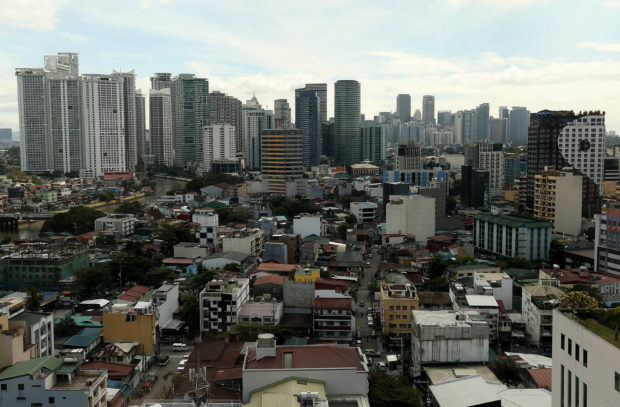Think tank cuts PH growth forecast as oil price surge, poll uncertainty loom

(file photo) The skyline of Makati Business District in Makati City. INQUIRER PHOTO / RICHARD A. REYES
MANILA, Philippines—Barcelona-based think tank FocusEconomics has cut its 2022 growth forecast for the Philippines to 6.7 percent from 7 percent previously on two grounds—the spillover of a surge in global oil prices and uncertainty over who would replace President Rodrigo Duterte.
The updated March 22 consensus forecast of FocusEconomics’ panelists was now below the government’s 7 to 9 percent gross domestic product (GDP) growth target for this year.
“After surprising to the upside in the fourth quarter of 2021, GDP growth will probably be softer in the first quarter of 2022,” said FocusEconomics.
“This will be partially due to a tougher base effect, but underlying activity is also likely to weaken. An Omicron-induced spike in COVID-19 cases weighed on private spending at the outset of the first quarter,” it said.
Stricter pandemic restrictions were imposed in January as infections surged after the Christmas holidays but many parts of the country, including Metro Manila, eventually eased to the lowest alert level 1 alongside a drop in cases. FocusEconomics said further reopening of more economic sectors “bodes well for activity in the final stretch of the first quarter,” especially manufacturing.
Article continues after this advertisementBut FocusEconomics said it will not help that “uncertainty related to the May general elections is likely dampening investment,” possibly both private and public, the latter due to the election ban on new government projects ahead of the May 9 elections. Socioeconomic Planning Secretary Karl Kendrick Chua told the Inquirer on Thursday (March 24) that the economic team sought several exemptions for infrastructure projects from the spending ban, which starts on Friday (March 25).
Article continues after this advertisementA fallout from Vladimir Putin’s destruction of Ukraine, “soaring energy prices and weaker remittances growth are dragging on the external sector as well as private consumption, with the narrowing of the trade deficit seen in January likely to be reversed in February to March,” FocusEconomics said. High global oil costs were expected to bloat imports value and further widen the trade-in-goods as well as current account deficits, which, in turn, would weaken the peso.
Also, FocusEconomics said “new state subsidies will cushion the blow to the economy somewhat, but will also strain the fiscal balance,” referring to the cash aid, fuel subsidies and discounts, totaling at least P39.2 billion, to be given to sectors most badly hit by expensive oil.
President Rodrigo Duterte this week ordered the Department of Finance (DOF) to increase the unconditional cash transfer to the bottom 50-percent income households to P500 per month instead of only P200 a month, which many sectors had complained wouldn’t be enough.
For the entire 2022, FocusEconomics said “GDP growth should strengthen this year as greater vaccination coverage boosts household spending.”
“Fiscal and monetary stances should remain expansionary, while the government’s infrastructure program is likely to sustain investment,” FocusEconomics added, referring to “Build, Build, Build.”
However, FocusEconomics flagged lingering downside risks to the growth outlook coming from possibly new COVID strains, fiscal and external imbalances, the May elections, as well as oil price swings.
In a text message on Thursday, Budget Undersecretary Rolando Toledo said the government took steps to ensure that ongoing projects will continue and new infrastructure projects started ahead of the 45-day election ban.
“The Department of Budget and Management (DBM) has been promoting the proper and timely conduct of early procurement activities as stipulated under Section 20 of the 2022 General Appropriations Act (GAA),” said Toledo, also spokesperson of DBM.
“There were also initiatives to address possible procurement bottlenecks by streamlining the procurement process in the Government Procurement Reform Act and through the early preparation of the annual procurement plan, among others,” said Toledo.
“As early as December last year, the Government Procurement Policy Board (GPPB) has released reminders on the prohibited procurement activities to agencies, including the guidelines on exempted projects,” Toledo added.
The GPPB had told agencies that it will be up to the Commission on Elections (Comelec) to approve applications for exemption from the election ban on procurement of goods and services related to COVID-19 response, which may be needed between March 25 and May 8, 2022, coinciding with the campaign period.
“Moreover, the DBM has implemented an early release of allotments through the issuance of the GAA as allotment order at the start of this year for specific expenditure items which no longer require further details, additional documentary requirements and/or compliance with certain conditions,” said Toledo.
“This enables agencies to start the obligation of funds and program implementation right upon the approval of the [P5.02-trillion 2022 national budget],” Toledo added.